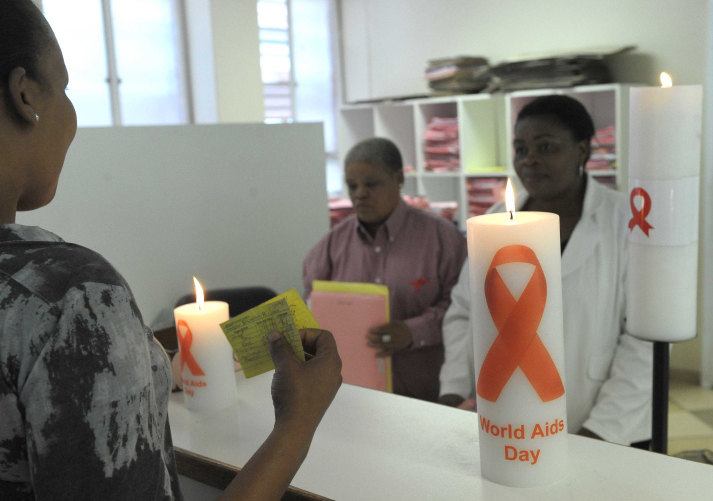|
||||||||||
| Home Nation World Business Opinion Lifestyle ChinAfrica Multimedia Columnists Documents Special Reports |
|
||||||||||
| Home Nation World Business Opinion Lifestyle ChinAfrica Multimedia Columnists Documents Special Reports |
| China |
| Defending the Frontier |
| Community health workers reaching remote areas help translate aspirations of ending the AIDS epidemic into concrete results in Africa |
| By Hou Weili | VOL.9 December 2017 ·2017-11-29 |

"We have to know who is living with HIV before we can offer them medical services. This is the first step," Liu told ChinAfrica. Funded by Support Health and Education Development, a local non-governmental organization (NGO), Liu arrived in a rural village in the suburb of Kaduna, Nigeria in 2011 and devoted herself to the welfare of women and children who were infected with HIV. Despite the high rate of infection in the area, people were reluctant to get free tests, receive treatment drugs or use condoms for transmission prevention because of the stigma and discrimination leveled against those living with HIV.
Unable to provide effective service delivery, Liu found herself in a predicament. To get around the problem she recalled her mother, also a medical doctor, talking about the concept of "barefoot doctors."
Popular in the 1960s and 1970s when rural China was severely impoverished, these medical workers saved lives in areas where there were no proper hospitals or doctors. Mastering some basic medical skills and familiar with local residents, barefoot doctors could cure ordinary diseases and deliver babies. Although not professionals, they were passionate about local residents' wellbeing, and were therefore well respected and much loved. The job was not stable and paid little. Apart from serving as "doctors," they were also farmers and were so poor that many of them had no shoes, leading to the moniker "barefoot doctors."
"Similarly, there were many educated youths who were jobless and stayed at home in the local community. Why couldn't they play [a more active] role?" recalled Liu, who currently works for the United Nations Joint Program on HIV/AIDS (UNAIDS) China.
Inspired by the barefoot doctors, she chose 20 young locals with medical or sociological education backgrounds and gave them basic training on how to test for HIV and promote local people's awareness on preventing the disease. They subsequently became community medical workers in a familiar neighborhood and carried out prevention and treatment programs with Liu.
Training local community medical workers is the backbone in fighting the AIDS epidemic in Africa, a lesson Liu learned from her volunteer experience. Now it has become a consensus among African countries, global organizations and China to prevent and control the disease in trilateral joint efforts of consolidating the defense against this epidemic's frontier.
Improving service delivery
To end the AIDS epidemic by 2030, UNAIDS set an ambitious 90-90-90 target by 2020, which calls for a scale-up of HIV testing so that 90 percent of all people living with HIV are aware of their infection, 90 percent of people diagnosed HIV positive are on sustained antiretroviral treatment (ART) and 90 percent of those on ART will have viral suppression.
Statistics from UNAIDS showed that globally, 60 percent of all people living with HIV knew their status, 46 percent of people living with HIV were on treatment and 38 percent achieved undetectable levels of HIV in 2015. In comparison, West and Central Africa lagged behind, achieving only 36 percent, 28 percent and 12 percent respectively.
"One of the reasons is that the HIV services fail to reach rural areas, leaving residents living with HIV unattended and breaking the continuum of treatment," said Liu.
Changes are on track. During the 29th African Union Summit in Addis Ababa, Ethiopia this July, African heads of state endorsed an initiative for anti-AIDS efforts to recruit, train and deploy 2 million community health workers across the continent by 2020.
Championed by President of Guinea and African Union Chair Alpha Condé, the initiative seeks to confront the acute health workforce shortages across Africa and improve access to health services for the most marginalized populations, including people living in rural areas.
Experience from China and some African countries have demonstrated that well-trained and properly supervised community health workers provide an excellent quality of care and improve the efficiency and impact of health spending. "Living in the communities they serve, community health workers bring a passion to their work and a laser-like focus on achieving results. They help devise the most effective service delivery strategies for HIV testing and treatment," said Michel Sidibe, Executive Director of UNAIDS.
Unlike traditional health facilities, which are often prohibitively far from where people live or work, community health workers take services directly to individuals and communities at a convenient time and place.
Broader socioeconomic returns

HIV self-testing kits are available for purchase from vending machines in Southwest Petroleum University in Chengdu City, southwest China’s Sichuan Province on November 27, 2016. Kits like this are available in many of China’s universities to help raise awareness about HIV among the youth population.
"Sustainable community health work is a matter of survival and development in Ethiopia," said Ethiopian Prime Minister Hailemariam Desalegn. "The community health workers have made better health happen. Achieving universal health coverage is not possible without building community health systems."
UNAIDS estimates that there are more than 1 million community health workers in Africa today. In the next two years, another 1 million should be recruited to meet the target of achieving universal health coverage, according to UNAIDS. While they may hold the key to achieving the 90-90-90 targets, the benefits extend well beyond the AIDS response.
"[The 2 million community health workers initiative] will also expedite gains across the health targets of Sus
tainable Development Goals set by UN, create new jobs that will strengthen local and national economies and offer new opportunities for young people to prosper," said Sidibe.
According to UNAIDS, the recruitment of 2 million paid community health workers in Africa would represent 14 percent of all new wage-paying jobs created regionally between 2005 and 2010.
More than a good job, it is also an opportunity for talented young people to give back to their local community, turning the "demographic bulge" to real "demographic dividend" to ensure social stability and accelerate realization of the socioeconomic transformation envisaged in the AU Agenda 2063, said Condé.
"Healthier populations are more productive. By improving health outcomes and increasing productivity in underserved communities, investments in community health workers can generate massive indirect economic returns," said Liu.
China's experience
As one of the originators of community health workers, or barefoot doctors, China definitely has some lessons to contribute. Cooperation in the medical sectors, especially training medical staff, has been one of the highlights under the mechanism of the Forum on China-Africa Cooperation (FOCAC). During the FOCAC Johannesburg Summit in 2015, China pledged to assist Africa in strengthening prevention and treatment of infectious and communicable diseases in Africa, and train doctors, nurses, public health workers and administrative personnel.
Lee Njagi, an official with the Kenyan Ministry of Health who came to China for a HIV management training program, said Africa could draw lessons from China's unique model of dealing with HIV. "The country's major success has been on research and innovative ways of dealing with specific risk groups of the HIV virus."
Liu said China's experience could be implemented with the 2 million community medical workers being deployed in remote areas and could make a real difference in Africa's efforts toward eradicating the virus.
| About Us | Contact Us | Advertise with Us | Subscribe |
| Copyright Beijing Review All rights reserved 京ICP备08005356号-5 京公网安备110102005860号 |